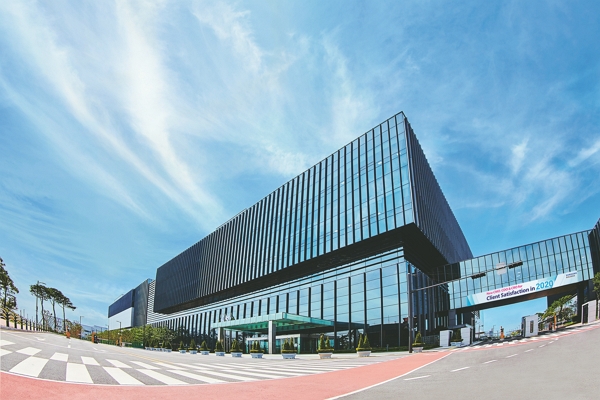For the first time since its inception, Samsung Biologics' quarterly sales exceeded 1 trillion won ($740.7 million) in the third quarter, thanks to an increase in sales from the operation of its fourth factory and improved operational efficiency.

Samsung Biologics announced Wednesday a consolidated revenue of 1.034 trillion won, up 18 percent from the same period in 2022. However, the company saw a slight decrease in operating profit after recording 318.5 billion won, down 1.9 percent year-on-year.
The company explained that the decrease in operating profit was due to the stronger won against the greenback this year.
The accumulated sales and operating profit in the first nine months this year stood at 2.6 trillion won and 763.7 billion won, up 29 percent and 14 percent compared to last year. Earlier, Samsung Biologics set its annual sales guidance for 2023 at over 3.6016 trillion won, marking a growth of over 20 percent from the previous year.
On a separate basis, Samsung Biologics reported revenue and operating profit of 882.7 billion won and 381.6 billion won, up 31 percent and 23 percent, in the third quarter, year-on-year.
Notably, the company recorded an operating profit margin of 43.2 percent for the third quarters, driven by robust order volumes based on long-term large-scale contract manufacturing organization (CMO) contracts, operational efficiency of its first to third plants, and sales from the fourth plant, which began operations last October.
Samsung Biologics has signed large-scale production contracts with major pharmaceutical companies like Pfizer and Novartis, and has already posted a record-high annual order amount of 2.726 trillion won.
As of October, the cumulative order amount is approximately $11.8 billion.
In response to the growing demand for biopharmaceuticals, Samsung Biologics has been constructing its fifth factory since last April, aiming to complete it by April 2025.
The fifth factory is designed with an aggregation of best practices from the construction processes of the previous four factories. The company is applying a "cookie-cut" approach, replicating a specific design to increase construction efficiency.
The production capacity of the fifth factory, located at the second bio-campus site, will be 180,000 liters, bringing the total capacity to 784,000 liters upon completion.
Additionally, as part of its portfolio expansion, the company is actively investing in the antibody-drug conjugate (ADC) sector. With a goal to start commercial production within 2024, the company is pushing forward with the construction of an ADC-exclusive production facility.
For sustainable growth, the company is focusing on Environmental, Social, and Governance (ESG) management.
The company has currently set a net-zero goal for 2050 and has undertaken activities like reducing greenhouse gas emissions, transitioning to renewable energy, and waste recycling.
Samsung Biologics also actively participates in the global Carbon Disclosure Project (CDP) and publishes the Task Force on Climate-related Financial Disclosures (TCFD) report. In 2022, the social value created by Samsung Biologics doubled from 2021, reaching KRW 3 trillion.
As for Samsung Bioepis, the sales and operating profit for the third quarter amounted to 262.1 billion won and 49.2 billion won, down 3 and 37 percent compared to the same period last year.
The company chalked up the decrease to one-off baseline effects, such as product approvals in the U.S.
Samsung Bioepis currently has a total of 10 biosimilar products under its pipeline and seven of these have received product approval in the global market, and three are undergoing approval processes following clinical trials.
Related articles
- Samsung Biologics, Kurma Partners team up to support biotech startups
- Samsung Biologics expects 20% surge in annual sales, riding high on Plant 4 success
- Samsung Biologics tops ₩3 trillion in annual orders for 1st time ever
- Samsung Biologics hosts Supplier ESG Day to encourage carbon neutrality
- Samsung Biologics gets EcoVadis' highest ESG rating

